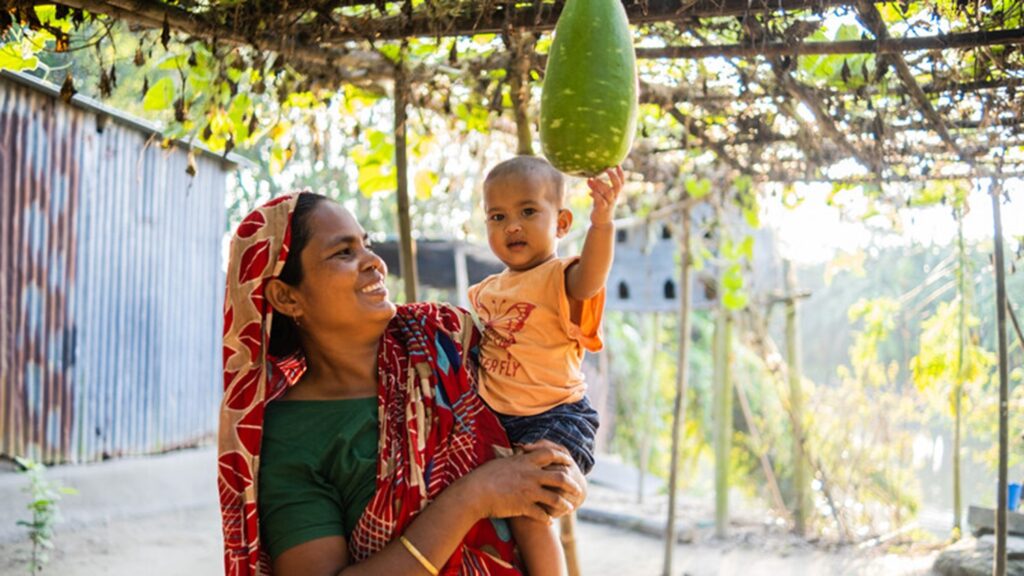
“…To keep the seeds in our own hands is the main thing. Without seeds, being a farmer is not possible…” Salina, small farmer in Bangladesh.
The fight for small-scale farmers to control their seeds
Seeds are life. They are the most basic tool needed by farmers to produce the food that feeds us all. For generations, small-scale farmers have freely swapped and shared a wide variety of seeds to produce nutritious food and maintain biodiversity. More recently, farmers have also developed seeds that ensure crops are resilient to climate change. However, their right to choose what seeds they use is increasingly under threat as new laws are introduced across the world that limit what small farmers can do with their seeds. These laws, which are being brought in with the support of global financial institutions such as the World Bank, overwhelmingly favour large agri-businesses. Instead of being able to choose their own seeds, small farmers must purchase commercial seeds – something that is good for big business profits but not so good for the farmers who grow the majority of the world’s food. It’s clear that our current global food system is in crisis, and at the heart of this crisis is a struggle over control of the world’s seeds. Protecting the freedom of farmers to choose seeds is a right we must all stand up for if we are to tackle global hunger while responding to the cry of the earth and the poor.
Throughout human history, small farmers have had the freedom to save, use, exchange and sell their seeds as they wish. This has allowed farmers control over their own food, and choice over how they use their land. In recent decades, however, governments across the world have adopted seed laws that have the potential to restrict farmers’ abilities to use their own local varieties of seeds.
This does not happen by chance. Powerful interests have been pushing for this. The World Bank for example, an institution that claims to help countries end poverty by ‘building resilience’1 has been actively promoting these seed laws. Far from building resilience, these laws often push small farmers into buying commercial hybrid varieties of seeds. Unlike farmers’ traditional seeds, which reproduce new seeds that can be replanted each year, these commercial seeds are often designed to be used only once.2 This means farmers have to buy new seeds every season, creating profit for businesses but dependency and potentially spiralling debt for small farmers.
Across the world, farmers have been pushing back against these new seed laws that put power into the hands of big business. Farmers groups such as La Via Campesina, an international movement of small-scale farmers, argue for an alternative system of seed sovereignty instead.3
Seed sovereignty is the right for farmers to save, use, exchange and sell their own seeds. It is about farmers having the power to choose the seeds they plant, rather than that power belonging to corporations or international institutions.
Low-income countries are often dependent on taking grants and loans from international financial institutions such as the World Bank. In return for this financing, the World Bank can insist that certain policy conditions are met. This includes policies related to seeds, meaning countries have been required to introduce new seed laws to be considered for financial support.4
These new seed laws tend to be favourable to big agribusiness, often supporting a shift towards commercial seeds, away from farmer-owned seeds.5
This practice has helped private companies gain control of the global seed market, and therefore completely shifting the power dynamics around seed ownership.
This has been going on for decades. As far back as 1988, the World Bank demanded India introduce a new policy that opened up its seed markets to foreign investors.6 It continues to promote these seeds laws, for instance placing conditions on financing for Liberia in 2020 to “provide for sustainable seeds delivery system and private sector participation in seeds production and marketing.”7Big business seed grab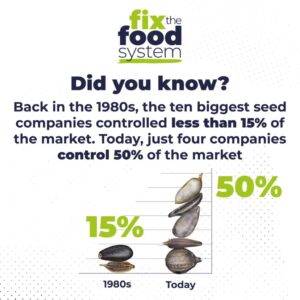
In the 1980s, the ten biggest companies controlled less than 15% of the global seed market.8 Today that control is concentrated in the hands of just four companies – Bayer, Corteva, BASF and Syngenta – who control 50% of the market.9 The largest of these agribusinesses is Bayer, which merged with another giant, Monsanto in 2016.
This means that just a handful of private companies own half of one of the most precious resources needed to feed the world.
Another way that giant agribusinesses are wrangling control away from farmers is through appropriating their traditional seed varieties. For example, a seed that has been used and shared for hundreds of years could potentially be ‘discovered’ by a big agribusiness, and patented. When a seed has been appropriated in this way, its use or exchange can be restricted or prohibited. By allowing patents on plants, the fundamental right of farming communities to use or exchange their seeds could even be criminalised.10 The goal of big business is clear: to restrict farmers’ ability to save and share seeds so they have fewer options and are pushed towards buying commercial seeds instead.
In Bangladesh, CAFOD works with the community based policy research organisation, UBINIG, that focuses on agroecological approaches to farming. They work with farmers as part of a movement called Nayakrishi which defends agriculture as a way of life for rural communities and opposes the imposition of these new seed laws, and related policies. Jahangir Alam Jony, Director of UBINIG has said: “…The problem is there are some government scientists who are working for the multinational companies, like Monsanto, so they want to pass policies not for the nation, but for their own individual interests. Now they are saying that we need to introduce genetically modified rice varieties – for example, to cure night blindness (…) But the nayakrishi farmers are challenging this, saying we already have many varieties of crops that are high in vitamin A, so we don’t need this one – it will require chemicals and pesticides, and also, we will not be able to keep the seeds in our own hands. The government are under pressure from different companies, the IMF and World Bank, but they are starting to work with us…”
Bad for people, bad for the planet
Once communities stop using their traditional seeds, they become dependent on commercial hybrid seeds which require the use of chemical fertilisers and pesticides to grow. These are both environmentally damaging and dangerous to human health. Research suggests that pesticides are responsible for as many as 385 million cases of poisoning and at least 11,000 deaths each year across the world.11
Uniform, one size fits all, commercial seeds are at the foundation of the monoculture agricultural model which means growing one crop species at a time in a field.12 While the monoculture approach might increase yields of the single crop grown, it is bad news for biodiversity. During the 20th century, an estimated 75% of all crop varieties were irretrievably lost as farmers were pushed to stop using their own local seeds for more uniform, corporate supplied sources.13 For example, in the Philippines over 3,000 varieties of rice were grown in the 1960s. By the 1980s, just two rice varieties accounted for 98% of the planted area in the country.14
A lack of biodiversity only increases global vulnerability to climate change, with weak ecosystems and monocultures unable to cope with increasingly extreme weather.15 This in turn impacts food security as farmers are less well equipped to cope with sudden shocks such as climate disasters.16
Using commercial seeds that are dependent on chemical inputs also has damaging impacts on the soils vital to growing food. Soil degradation can make whole areas of land unusable in the long term for growing more food. This often leads to the clearing of forests to replace the lost land, causing further environmental damage.
Women as knowledge keepers of seeds 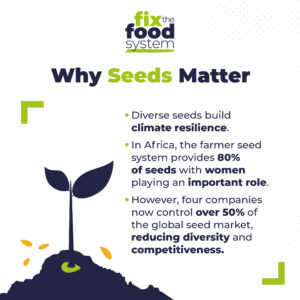
In many communities, women play a vital role in saving and sharing the seeds of traditional crops. This knowledge is at the foundation of the development of new varieties of seeds that help to build climate resilience and protect biodiversity as well as the cultural heritage of communities.
CAFOD’s partner in Bolivia, CENDA, works with rural women, supporting them to continue building their knowledge of farming in harmony with nature – often called agroecology – that is rooted in traditional practices. CENDA’s support has increased the diversity of agricultural production, leading to more nutritious food for these communities. This increased diversity has also improved their resilience to climate shocks.
When countries adopt new seed laws, women’s access to seeds is potentially reduced, and the opportunities for income-generation and for ensuring a nutritious diet for their children are put at risk.
Farmers fighting back
Salina is a seed saver. She lives with her husband Mogador in Gorasin village, in the district of Tangail, Bangladesh. Salina and Mogador have received training from CAFOD’s partner organisation, UBINIG.
“I started trying some mixed cropping, and then two years ago me and my husband joined with the CAFOD programme. We are very happy now because we put very little in, we don’t need money for chemical fertilisers or seeds, but the last two years we have earned enough for our life just from ecological farming. When there is heavy rain the chemical farmers who bought seeds from outside don’t have any options. Because they bought the seeds, they already spent their money on seeds and cannot buy new ones. “Seeds should be in the farmer’s house, so there is always a backup. Seeds should be stored in a collective way as well. If I have 7 or 10 varieties of seeds, other farmers should have the other 15 or 20 varieties, and we should develop relationships and exchange seeds with each other.
“Diversity is very important also, because then you have no risks. If one crop is damaged, another crop will survive. And one farmer alone cannot maintain that diversity – we need to work together and share. It takes collective thinking…”
Seed sovereignty matters to all 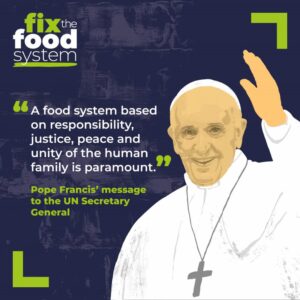
Restoring the collective ownership of seeds back to communities is vital to ensuring that everyone has access to nutritious food, and particularly important for guaranteeing food security for the poorest communities. It is also the corner stone to ensuring biodiversity and climate resilience. But as long as organisations such as the World Bank continue pushing for policies that put profits first, we are all at risk.
Even the United Nation’s Food and Agriculture Organisation (FAO) has recognised that these seed laws are a major threat to our global food system as they can be a barrier to ensuring a diverse food system.17
And Pope Francis has clearly spoken out against the wrongs of the current global food system. He reminds us that we need to tackle the great imbalance of power which is undermining the growth of a sustainable food system. He says:
“What peasants, fisherman and farmers conserve in memory handed down through the generations and which is now derided and forgotten by a model of production that is entirely to the advantage of a limited group and a tiny portion of the world population. Let us remember that it is a model which, despite all its science, allows around 800 million people to continue to go hungry.”18
You can make a difference!
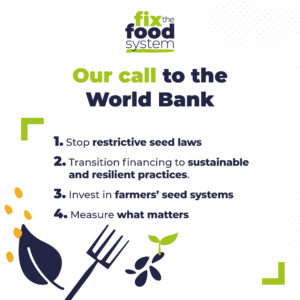 We can follow Pope Francis’s call and play our part in transforming the food system for the benefit of people and planet. The UK Government is a major player at the World Bank and one of the most influential countries in shaping the Bank’s policies. If enough of us call on the UK representatives at the World Bank to do the right thing and stand up for farmers’ rights to choose their own seeds, we can make a difference.
We can follow Pope Francis’s call and play our part in transforming the food system for the benefit of people and planet. The UK Government is a major player at the World Bank and one of the most influential countries in shaping the Bank’s policies. If enough of us call on the UK representatives at the World Bank to do the right thing and stand up for farmers’ rights to choose their own seeds, we can make a difference.
Take action here and be sure to spread the word!
Find out more from CAFOD here.

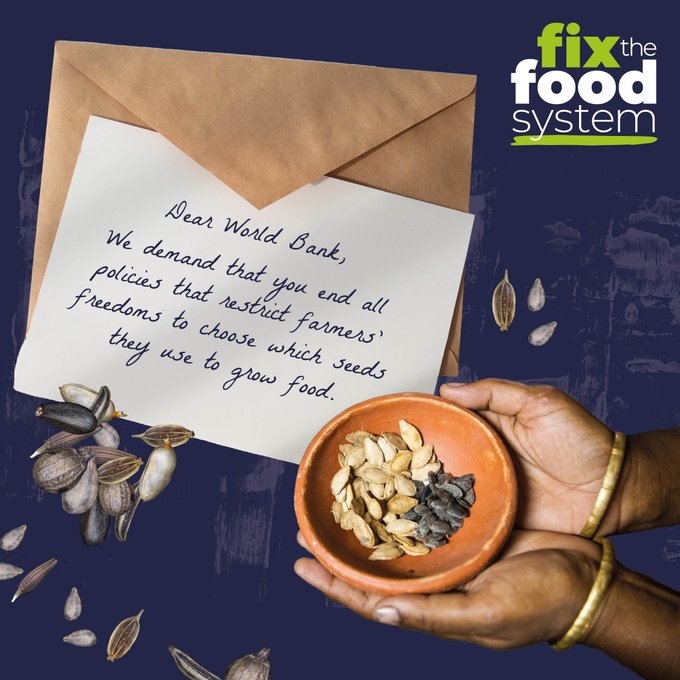
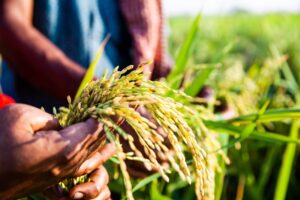
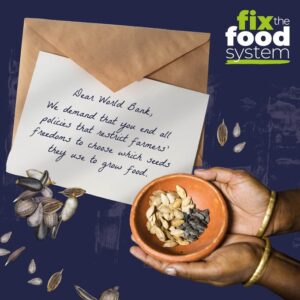
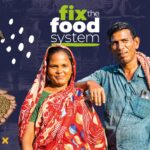
Leave A Comment